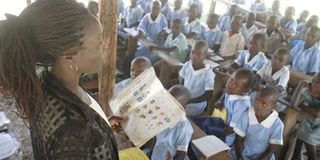Teacher quality will make or break education reform

A teacher and students at a primary school. PHOTO | TOM OTIENO | NATION MEDIA GROUP
What you need to know:
- Teachers in service, people training to be teachers and those willing to join the service need to be engaged in the dialogue for reform.
- Teachers must own and facilitate the reform every step of the way.
The education reform vision of having an engaged, empowered and ethical citizen shall not be realised if the quality of our national teaching force is not overhauled!
Teacher education, support and mentoring is the fulcrum upon which the education reform agenda and practice is going to resolve going forward.
The last review of Teacher education in Kenya was done over 10 years ago and the current practice is not in line with the Constitution, regional political and trade protocols, Vision 2030, Sustainable Development Goals and the emerging trends in learner management, assessment and delivery of the curriculum by use of 21st Century skills.
From the foregoing, it is evident that teacher education needs to be revised for the purposes of anchoring education reform.
For this to happen, the teachers in the service, those in training and those willing to join the service need to be engaged in the dialogue for reform. Teachers must own and facilitate the reform every step of the way.
The teaching force must understand three fundamentals issues: Why the reform? For whom? And To what extent? This should include helping the practising teacher understand the purpose of the reform, its scope, the content under consideration during the reform window, the desired balance obtainable, delivery approaches and the differentiation about planning, management and the new assessment approaches.
EMPHASISE NEED
The Continuous Professional Teacher Development (CPTD) needs to emphasise the need to improve on the classroom practice by combining the process of enhancing staffing numbers, improving advisory work by Curriculum Support Officers and enhancing working conditions and welfare gaps.
Going forward, the Kenya Institute of Curriculum Development and TSC need to work hand in hand with teachers to actualise the reform dream.
According to the research report and the draft framework for teacher education in Kenya realised in November, 2016, 16 point recommendations are made. They include but are not limited to: raising the entry bar into teacher education to a minimum of C+ at all levels, standardising diploma training prior to two years for all: Early Childhood Development Education, primary teacher education, diploma in special needs education and diploma in technical teacher education.
There is also the suggestion to ensure the practicums (teaching practice) sessions happen during school terms, promote talent identification and monitor teacher education amongst a raft of other recommendations.
First, to take this to the next level, the teacher needs to be sensitised on the proposals like training contact hours have been defined as 2,160 hours of course work and 1080 hours of practicums for Early Years Teacher Education and middle school teacher education.
THREE LEVELS
The new structure shall be in three levels: Early teacher education, Middle school teacher education and Secondary teacher education.
The structure of teacher education is recommended to be offered as an integrated Bachelor of Education or Post Graduate Diploma. For integrated B.Ed., 252 hours per teaching subject (each candidate must study two subjects) and a practicum of 2160 hours.
Those joining at Post Graduate Diploma must have two teaching subjects acquired during their bachelor’s degree.
The post Diploma in Technical Teacher Education/Diploma in Special Needs Teacher Education is recommended to be offered as a post diploma or Post Graduate Diploma and must have a minimum of three years’ work experience in the relevant industry.
There is also the suggestion to develop Key Quality Teaching Standards and competency indications to form a basis for the assessment and identification of appropriate Continuous Professional Teacher Development areas for growth.
Jonathan Wesaya is country director, Discovery Learning Alliance-Kenya and winner, 2016 'Business Daily' Top 40 Under 40 Men.





